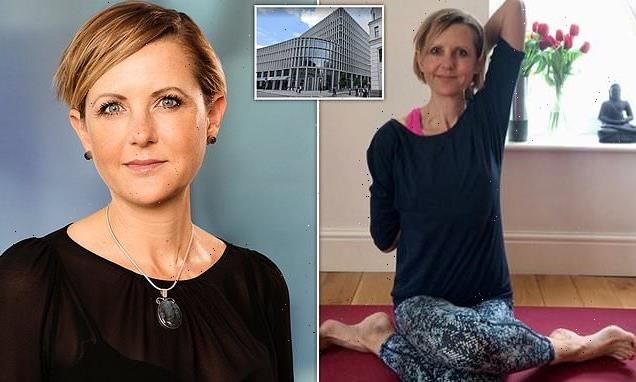Barrister, 46, sues top City law firm Ropes and Gray for £200,000 claiming stress ended her lucrative career after a ‘meltdown’ caused by her ‘intolerable’ workload
- Barrister Joanna Torode, 46, left role at London office of law firm Ropes and Gray
- She claims working conditions were so ‘horrific’ she had a nervous breakdown
- Ms Torode says she has been unable to work in the legal profession since 2018
- Instead the lawyer is running yoga classes raising money for children in India
- She is suing the firm for least £200,000 claiming a premature end to her career
- The US company is fighting claim and denies that her workload was excessive
A high-flying lawyer who had ‘meltdown’ due to her ‘intolerable’ workload at a top City law firm is suing the company claiming stress ended her lucrative career.
Barrister turned yoga instructor Joanna Torode, 46, says working conditions at the London office of international law firm Ropes and Gray were so ‘horrific’ that she had a nervous breakdown, bursting into tears at work.
After an ‘exodus’ of colleagues, she had been left with an ‘unrelenting’ workload and was often the last to leave at night, leading to her emotional collapse from stress over Christmas 2017.
She says she has been unable to work since being admitted to hospital in April 2018.
The barrister, who now runs charity yoga classes raising money for children in India, is suing Ropes and Gray for damages for the premature end to her law career.
According to court documents, her claim is for at least £200,000. However, it is likely to run into the millions due to her claim for the loss of her ‘substantial’ salary in the City.
Though it is not clear what the experienced barrister’s salary was, newly qualified lawyers at the firm’s London office earn as much as £147,000-a-year, plus bonuses.
The US firm, based in Boston, Massachusetts, is fighting the damages bid, claiming that – as a very high-earning City lawyer – it was expected that Ms Torode would sometimes work long hours.
And they deny that her workload was excessive in any way, suggesting that she was ‘over-focused on promotion’ and that her tears at Christmas were simply because she was passed over whilst other colleagues moved up the career ladder.
Barrister turned yoga instructor Joanna Torode (pictured), 46, says working conditions at the London office of international law firm Ropes and Gray were so ‘horrific’ that she had a nervous breakdown, bursting into tears at work
The barrister, who now runs her own yoga business, is suing Ropes and Gray (pictured) for damages for the premature end to her law career
Outlining the claim in a writ filed at the High Court, Ms Torode’s barrister, Jeremy Hyam QC, says she began her employment at Ropes and Gray’s Ludgate Hill offices in June 2017.
She was a specialist in financial crime and money laundering regulations, including cryptocurrency, and joined the firm’s ‘government enforcement’ team as an ’employed barrister’.
However, only two-and-a-half months later, there was an ‘exodus’ from her team, as several colleagues left to join another firm.
It left Ms Torode, of Whitechapel, east London, as the only English-qualified lawyer in the team, so that overnight she was faced with a ‘substantially increased workload and responsibility,’ says the QC.
Her working conditions became ‘chaotic, stressful and pressurised’ and she told her employer that she needed support, claims Mr Hyam.
Outlining the claim in a writ filed at the High Court, Ms Torode’s (pictured) barrister, Jeremy Hyam QC, says she began her employment at Ropes and Gray’s Ludgate Hill offices in June 2017
‘Not only would she frequently be the last lawyer on her floor to leave in the evening as well as frequently working over weekends, but the intensity and pressure of her work was significantly intensified given the absence of any effective support at junior and senior level, and the absence of any effective teamworking,’ he says.
‘By late November and into early December 2017 the claimant was feeling exhausted and she was showing the incipient signs of major depression with her mood worsening.’
Ms Torode had expected promotion within the firm, but at Christmas 2017 was told at a meeting that two colleagues would be promoted, but she would not, says the barrister.
‘The claimant was visibly upset by the news and burst into tears,’ he continues.
‘Her obvious upset and sobbing was a significant event that went beyond a brief loss of composure.
‘It was witnessed by others and was a clear indication of the fragile emotional state she was in as a result of the unrelenting and overwhelming pressure of work she had been under.
‘It was, or should have been obvious to the defendant that unless the claimant received appropriate support with her workload and responsibilities she was at risk of a serious deterioration in her mental state.’
He claims that Ropes and Gray’s attitude towards the incident was that, while she was good enough to be a partner, getting emotional ‘was not appropriate conduct in the office’ and would harm her chance of promotion.
Ms Torode eventually went off sick in April 2018 after being told she would face a disciplinary hearing after giving an interview to a journalist, which it was said could have been taken as critical of a client.
Mr Hyam says Ms Torode had not realised that her comments could be taken as criticism of the client and that she had given the interview at a time when she was struggling to cope with the ‘overwhelming demands’ of her work and was at risk of ‘dropping the ball.’
Ms Torode eventually went off sick in April 2018 after being told she would face a disciplinary hearing after giving an interview to a journalist, which it was said could have been taken as critical of a client
The ‘heavy handed and disproportionate’ conduct of the disciplinary investigation, including her being suspended and told she could be sacked, had triggered a ‘sudden deterioration’ in her mental health, leading to her being hospitalised.
Accusing Ropes and Gray of causing Ms Torode’s illness, he said: ‘The claimant’s mental illness was caused or materially contributed to by the negligence, breach of contract and/or breach of statutory duties of the defendant.
‘The claimant…now suffers from a major depressive disorder, recurrent, treatment resistant, moderately severe without psychotic features with moderate to severe anxious distress.
‘She is unlikely to be able to return to work as a lawyer…The claimant has lost the ability to practice her chosen profession in which she was a specialist.
‘She is very unlikely to return to employment as a lawyer and has suffered substantial loss of earnings in consequence.’
Defending the claim, Robert Glancy QC, for Ropes and Gray, denies that Ms Torode’s workload was excessive, particularly for such a well-qualified, experienced lawyer on a ‘substantial’ salary and bonuses.
‘The work that she did in the evenings and to some extent at the weekends was normal for senior City lawyers who were substantially remunerated and was neither out of the norm, nor excessive,’ he says.
‘The claimant either knew or ought to have known, when she accepted the employment as a well-remunerated City lawyer, that she would on occasions have to work in the evenings and at weekends.
‘It is specifically denied that the claimant’s workload, either in relation to the amount of work or the complexity of the work, was in any way excessive or unreasonable for a senior lawyer who was being paid a substantial salary and bonuses in a City firm.
‘In particular, it is denied that the situation in which the claimant was working was either chaotic, unduly stressful or excessively pressurised.’
She had not asked for more staff to help her with the workload, but instead – ‘excessively and unrealistically focused on promotion’ – as part of her determination to ‘build a team.’
The announcement at Christmas 2017 that she was not being promoted was no surprise to her, since she had already been told privately.
‘The claimant’s reaction to this information was, typically of her, to become upset, frustrated and angry when she did not get what she wanted or thought that she should have,’ he says.
When she then found out at Christmas that the two colleagues were being promoted, her reaction was to become ‘angry and cross.’
‘Although the claimant may have shed some tears, it is denied that the claimant’s reaction is properly characterised as a ‘meltdown’ or a significant event that went beyond a brief loss of composure,’ the QC adds.
‘The claimant’s description of this…is significantly exaggerated.
‘It is denied that this “event” was a clear or any indication that the claimant was in a fragile emotional state and it is further denied that this alleged emotional state was as a result of any unrelenting and overwhelming pressure that the claimant had been under, as she had not been under any such pressure.’
The claim and defence documents have been filed at the High Court (pictured: The Royal Courts of Justice) in London, but the case has not yet been heard by a judge
He says the disciplinary procedure that was put in place after she gave the interview was a ‘reasonable and appropriate’ reaction to a ‘gross error of judgment’ on her part.
She knew she should only give an interview after informing the firm’s PR department, but had done so anyway, he says.
‘In the circumstances, suspension of the claimant was justified and appropriate and the defendant had no knowledge, actual or constructive, of the claimant’s alleged precarious mental state at this time.’
The claim and defence documents have been filed at the High Court in London, but the case has not yet been heard by a judge.
MailOnline has approached Ropes and Gray for a comment.
Source: Read Full Article










